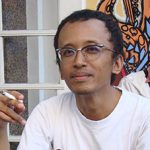(temporarily available only in English)
Nicolás Echevarría is a director, producer and cinematographer who has worked in both film and television, making documentaries and fiction films. One of Mexico’s prominent filmmakers. He began to make films following the massacre at Tlatelolco, section of Mexico City, in 1968. His film combines a post-colonial perspective with carefully chosen music, camerawork and montage elements. From a performance Super 8 film about a contortionist to an engaging documentary on Indian creation myths, his approach to his subjects always demonstrates profound empathy, intimacy and scrupulous viewing. His feature debut Cabeza de Vaca (1988) was an official selection of the Berlin Film Festival and represented Mexico in the Academy Awards. The film also won the Makhila d’Or Award at the Biarritz Film Festival and Best Film at the Muestra de Cine Mexicano, among other prizes. He received a John Simon Guggenheim Memorial Foundation Fellowship, among other honors. Echevarría studied architecture at the Universidad de Guadalajara, music at the Conservatorio Nacional in Mexico City, and animation at the School of Visual Arts in New York. Done lots of works in the subjects of indigenous people in Mexico. At one occasion at the International Short Films Festival Oberhausen, we had a great opportunity to do an interview with the man himself. The discussion took place at a cozy street café near Lichtburg Palast, the festival venue, in the chill Saturday afternoon of May 2nd 2009. He told us that myth is an important element to provoke creativity. “I am a believer,” he said. “I believe in myths.” Following to the statement, it is interesting to know how he viewed the world that surrounds him. So, here it is, our discussion with one of Mexico’s foremost filmmakers, Nicolás Echevarría.

photo © Daniel Gasenzer / www.kurzfilmtage.de
Why did you choose film as your career?
Well, I originally studied architecture. After two years I quit, because I was sure that I wanted to be a musician. Then I studied music for three years, but I also quit. So, I went to New York, became a waiter on a restaurant at the Central Park. I made a friend there, who’s a filmmaker, and he told me that I should be a filmmaker too. He said that he will be my Godfather and lent me a 16mm camera. From then, I became crazy and started to shoot everything. In New York, I join a film workshop call Millenium. This is where the underground filmmakers in New York used to get together and share their works. I’ve shown my film there. Unfortunately the film is lost. One year after, I came back to Mexico, and I started shooting my first serious film, which it was shown here in Oberhausen. Till now, I believe that film is my way of life.
Is it Simple for you to make a film?
I never thought that making film is simple.
I see you one of those men who believe in visual language. How do you fit in?
Yes. But it is difficult to find new style as a filmmaker. For some people it is easy, but for me it’s more difficult. Although I think there’s a lot of my self in my films. For instance, I think Judea is the only of my films that I like better, since it mostly done with images and music. I’ve done it a lot, but I feel more comfortable when I’m not using words, when I don’t have to use a narrator and things got easy for me. I like films with a non-narration. Though I’ve done mostly long-featured documentary and a couple of long-featured fiction film, I got very few films with narration.
Of all the genres, why did you choose documentary?
It wasn’t really something that I chose. When I was young, when I was started to making film, it was really difficult in Mexico to make a film with the industry. So the only thing you could do is making documentary. It was very difficult. It was a syndicate. And it was very difficult also to enter the union and making film.
The government support filmmakers, right?
Yes. In Mexico we have Instituto Mexicano di Cinematografia. The institution helps filmmakers, but the politics are changing all the time. So, different policy all the time. Sometimes it work very well, sometimes it’s not. So, when filmmakers attempted to produce a film, it is depend on their politics. The allocation of money is hard to guess.
I watched Judea yesterday, and I found it as really your style. Can you explain about the film?
I think Judea is more of my authentic film, although it was my second film. When I made it, I wasn’t very sure of what I was doing. I stop watching it for sometimes, but everytime I see it, I like it better. Because I see really a lot of me. It’s more of my soul in it, more than any of my films. It was just like you have different children and one is your favorite.

You portrays lots of indigenous in your films, what are you trying to represent?
This is like a passion for me for many years to work with different indigenous in Mexico. With the thing of religion and also the use of sacre provision for religious purposes. Yes, Catholicism in Mexico is completely different with European Catholic, since we perform syncretism and it’s a mixture. And because we were conquered and colonized by Spain. It is hard to evangelize a new religion in Mexico, so the Spanish were looking for another method.
Do you believe that syncretism is a way to rebel against colonialism?
No, I don’t think so. The Spanish build the temple on top of the pyramid. Sometime they destroy the pyramid and with the same stone they built a new temple. So, what happen is, in the root of Mexicans is the old religion and at the top it’s a Catholic religion. Inside, the people has many elements of the pre-Spanish time.
I see in Poetas Campesinos, you are able to engage the subject and the object. How do you manage for that?
Mainly because I work with very few people. And I don’t know, as far as I consider, I never had any difficulties of getting near. I always get very close and it comes naturally. Though I am aware that I am an outsider. I am totally conscious that their culture don’t have very much to do with me. But at the same time I feel really connected with those people. From the beginning, I always felt a lot of confidence, and I think I’ve shown the feeling to the people I work with. Very little, in my whole career as a filmmaker, that I have problems. In some of my films, I also work with a big camera, but it doesn’t effected them. So, I think that I’ve been very lucky.
What is a frame for you? You know, sometimes working with the what so-called “exotic” subject giving an exotic feeling too when the camera is started to frame the subject. But, somehow, I didn’t feel that in your film. Can you explain that?
I think my shooting is very orthodox. I don’t do many crazy things. My film is different because the subject is different. And because I try to go to the soul of the film. I don’t like to use effect. So, I don’t like to do exotic things with the camera. My camera is very direct and I try to find the soul of what I’m doing. This what makes the film’s better. And I know that my film is different. I try to get near and for me that’s the main purpose of filmmaking.
What is your perspective toward Indian? What is an Indian for you?
I’ve done about ten films with the subject of Indian. One thing for sure, the Indian has to keep their own culture. There are many of Indian people that don’t speak their language anymore. Most of them are become Mestizos now. Many grooms in the group has been stolen in the last century. Right now there’re about 60 groups and it came to worry that those groups will loose their language. For me, Indian is meaningful since I have Indian blood. My grandfather is Indian.
I think what is really important is that, I am not in favor of isolating Indian community. I don’t share the idea of isolating and puritize Indian community. I think that what the Indian has to do is to keep their language and their culture. It doesn’t matter if they are marrying the Germans or Americans or a neighbor who is not Indian. I think what is really important for them is to keep their language and their culture, but at the sametime assimilate to the modernism, go to the university and learn.
So, what is the most significant political changes in Mexico toward Indian communities?
There are two directions. One who think that Indian should be protected and isolated and one who think that they should assimilated. I’m not in favor of supporting those two kind of thinkings. Well, it’s more common to see the men marries foreigners than a woman Indian marries other community. Like I said, the most important thing is to keep the language, because everytime we loose the language we loose something great. The indian transmit their culture orally. They don’t have books, so this is the way they learn everything about the world. There are books of course, written by anthropologists or ethnologists, but they don’t read them, with a few exception for sure. I know many of them are lawyers and doctors.
It gets me wonder, how do you transfer these ideas into films?
My only purposes is to portrait. But as you know, a portrait is contaminated by you. I always had this doubt when I made my films. The question like, what else that I should take, to explain, to try to inform or simply to create the atmosphere without many words that tries to transmit it. And I’ve done both things. I have some films with a narrator and I am pretentious enough to try to explain. In another thing I don’t care to do that very much, and I try to let myself go and only to portrait. I prefer a film like Judea because I always believe that a film is much better without narration. Though I aware that in some films, it is very hard to transmit the very deep purpose of the ritual religion without a narration. Because ritual and religion is very complex and hard to explain, and it’s very interesting.
So, Catholicism and stuffs like Indian has strong influence for you?
Yes, definitely. It’s not an accident that I dedicated many years of my life to try to portrait their world. I think it’s part of my education. I am educated in a way and I am influence by it.
What can you say about the post-colonial Latin America today?
Each country in Latin America has a very similar experience. Especially, country like Peru and Colombia. They had very strong culture. In Argentina, I think it’s an exception, because they are very few and the colonialist kill them all. In Mexico, thankfully, the Spanish willing to learn instead of destroying the whole culture. Another stage is started in Mexico after the Indian were destroyed. So now, we know a lot about pre-Spanish time Mexican. We discovered more things. We can read almost every Mayan texts. We know a lot about many Indian groups.
Let me get back to your film, I am still a little bit confuse about the film, El Bano de Frida. What is it all about?
Well, it was a piece I made for a museum. A project by a photographer, Graciela Iturbide, a very good friend of mine. She has a big exposition in San Fransisco Museum of Modern Art. So, in this film, the very personal belongings of Frida Kahlo were shown here. It was interesting because the belongings are safe in a bathroom that wasn’t open in more than 50 years. We can find very intimate belongings; letters, photographs, corsettes, turtles, robe that was used in a hospital. Just like an Egyptian tomb. So my friend, Graciela, ask me to make a video while she was doing the photographs. That’s all. Nothing more. I made this piece, a very small piece, that was shown at the museum. Originally it wasn’t a film. It was an installation.
Tell us about film-scene in Mexico now?
I don’t know. I think they should do better. I think there are more interesting documentaries than features. There is a very interesting generation of documentary filmmakers. I don’t care about feature films because I don’t like it. I think that Mexican feature filmmakers always tries to imitate the American. We don’t have to do that.
Why, because documentary is presenting more reality than fiction?
No. it’s a different way of making film. In documentary, you can work with your own rhythm, work with less money. You own what you do, which is very important, contrary when you make a fiction. You work with the producer, an asshole, and you know they are terrible. But it’s really complicated, because there is also a good generation of screen-writer. I don’t know a lot about the actors and actresses, but it come and go, the success with Mexican fiction films. They made one good fiction film every four or five years. But I think that it over-estimated on what happen to feature films in Mexico.
What do you think about Oberhausen film festival?
It’s a very nice festival, actually. This is one of the best film festivals today. And I’ve seen very interesting films.

photo © Daniel Gasenzer / www.kurzfilmtage.de
How do you feel about your film that ever been rejected by the festival committee?
Yes. Judea ever been rejected. When I recently made it, I submitted it to Oberhausen and it was rejected. And that’s what the reason I’m here now. And this is my first time in Oberhausen.
How do you react to the rejection?
Well it was one of my first films. What can I say?





